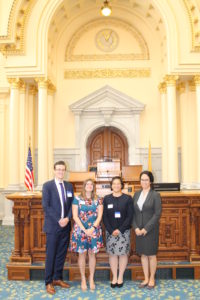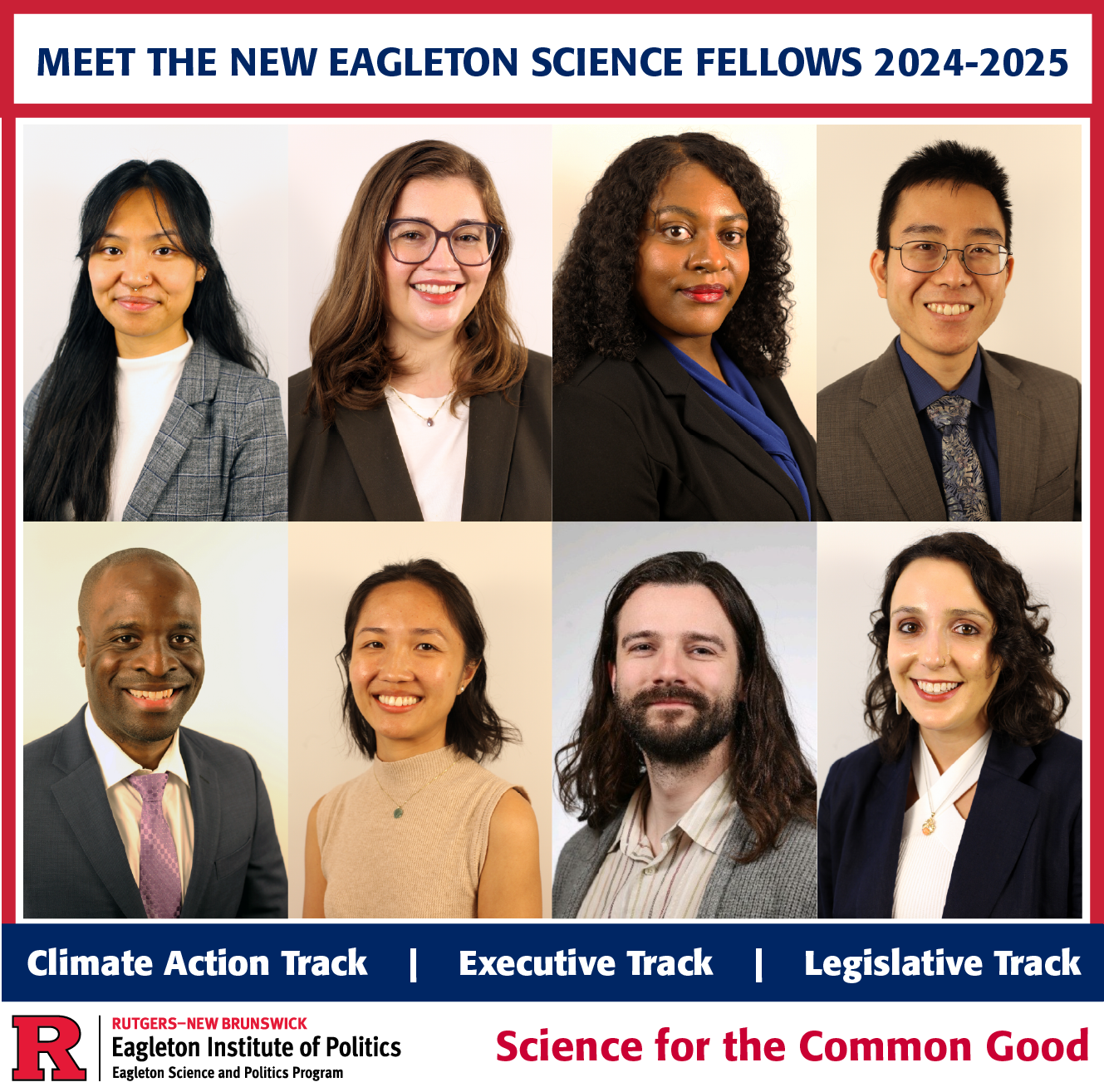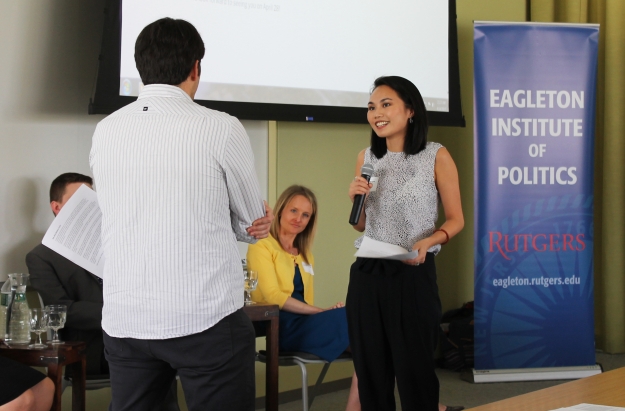Eagleton Science and Politics Program
Utilize your scientific training to help inform policy decisions in New Jersey. Join the Eagleton Science and Policy Program’s one-year fellowship for Ph.D. scientists.
The Program’s annual workshop series welcomes graduate students, post-docs, and faculty, providing a unique platform for them to learn and network.
Applications for the 2025/2026 fellowship year are now open. Apply now.
Eagleton Science and Politics Fellowship

The Eagleton Science and Politics Fellowship offers Ph.D.-level scientists and engineers the opportunity to apply their training and expertise to the development and implementation of relevant state policy. As full-time aides in the executive or legislative branch, Science Fellows bring their advanced technical skills to service in state government.
During the one-year program, Science Fellows participate in the political process and support New Jersey state government officials in making evidence-based decisions in public policy areas involving science, engineering, and technology. Through this work, they develop an understanding of state government and learn how to build careers in public service.
The program begins with an intensive summer training seminar focused on New Jersey state politics and government, covering topics such as effective communication strategies, power structures, and political processes. Throughout the year, Science Fellows participate in professional development and networking sessions organized by the Institute.
“I have learned so much about civil service during my time at Eagleton. I know that I can take this invaluable experience with me as I move forward with my career.”
– Allison McCague, 2020 Eagleton Science Fellow
Overview
The Eagleton Science and Politics Fellowship is a year-long, full-time fellowship for doctoral-level scientists, engineers, and healthcare professionals in New Jersey state government.
Join the Fellowship email list to receive notifications about the Fellowship cycle and related events.
Requirements
1) Ph. D. or equivalent doctoral professional degree earned by July 1stof the fellowship year in natural sciences, engineering or healthcare. For examples see FAQ.
2) U.S. citizenship OR a suitable immigration status for non-residents to work in the U.S.
Rutgers University faculty, staff, and postdocs, as well as applicants from across the country and at all stages of their careers are encouraged to apply.
Application Timeline
- Application opens: December 2, 2024
- Priority Deadline: March 16, 2025
- Video interviews for selected applicants: March-May 2025
- Registration closes: May 18, 2025 (after Priority Deadline, applications are reviewed on a space-available basis)
- Final candidate notification: May 2025
- Pre-placement orientation and training: July 14, 2025
- Fellowship begins: August 2025
- Fellowship ends: July 13, 2026
Making an Impact
The Fellowship offers three tracks:
Climate Action Track – executive placement with a project specifically focused on climate-related issues in New Jersey including clean energy, energy storage, resiliency, or sustainability.
Executive Track – placement in one of New Jersey’s executive departments and agencies, including Departments of Health; Human Services; Children and Families; Transportation; Education; Environmental Protection, and others. A Science Fellow in this track may also work on climate-related topics.
Legislative Track – placement in one of New Jersey’s four partisan legislative offices: the Democratic or Republican staff in the State Senate or State Assembly.
“I believe I have the opportunity to make a real impact with my work, which is both meaningful to me and exciting.”
– Liana Vaccari, 2020 Eagleton Science Fellow
Eagleton Science Fellows

Learn more about the 2024-2025 Eagleton Science Fellows and their placements here.
Current Science Fellows
Ellenore Craine, Ph.D.
University of Alabama at Birmingham – Biochemistry
Placement: NJ Department of Environmental Protection
Florence Dou, Ph.D.
University of Washington – Inorganic Chemistry
Placement: NJ Board of Public Utilities
Aileen Eagleton, Ph.D.
Dartmouth College – Materials Chemistry
Placement: NJ Board of Public Utilities
Walker Gosrich, Ph.D.
University of Pennsylvania — Mechanical Engineering (Robotics/AI)
Placement: NJ Office of Innovation
Sadie Novak, Ph.D.
Syracuse University — Chemistry
Placement: New Jersey Senate Majority Office
Uchenna Orji, MD
Rutgers Robert Wood Johnson Medical School
Placement: NJ Department of Education
Julia Palmucci, Ph.D.
Duke University – Molecular Genetics and Microbiology
Placement: NJ Assembly Minority Office
Justin Wang, Ph.D.
The Scripps Research Institute – Molecular and Cell Biology
Placement: NJ Department of Children and Families
Eagleton Science and Politics Workshop
The Eagleton Science and Politics Workshop (ESPW) is a collaborative initiative that enables graduate students, post-docs, and faculty to explore intersections between science and politics in order to increase their understanding of how politics affects their disciplines and how they can effectively engage with political and policymaking leaders and institutions.
The workshop series aims to make connections and improve communication between scientists and policy-makers, as well as to expand the pool of scientifically trained graduates interested in public service careers.

“The science workshop has changed my career path.”
– Rutgers Graduate Student
Partners
The Eagleton Science and Politics Workshop is offered in collaboration with the following partners (list in formation):
- The Boggs Center on Developmental Disabilities, Rutgers Robert Wood Johnson Medical School, Rutgers Biomedical & Health Sciences
- Departments of Neuroscience & Cell Biology and Pediatrics, Rutgers Robert Wood Johnson Medical School
- Division of Life Sciences
- Edward J. Bloustein School of Planning and Public Policy
- Graduate School-New Brunswick
- Institute of Earth, Ocean, and Atmospheric Sciences
- Office of the Executive Dean, Rutgers School of Environmental and Biological Sciences
- The Office for the Promotion of Women in Science, Engineering and Mathematics (SciWomen)
- The Rutgers University iJOBS Program, funded by a Broadening Experiences in Scientific Training grant from the NIH
- Science and Policy and Advocacy at Rutgers (SPAR), a graduate student organization




